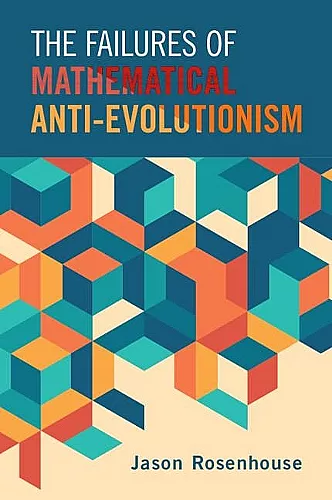The Failures of Mathematical Anti-Evolutionism
Format:Paperback
Publisher:Cambridge University Press
Published:12th May '22
Currently unavailable, and unfortunately no date known when it will be back
This paperback is available in another edition too:
- Hardback£62.00was £62.00(9781108842303)

This book refutes anti-scientific, superficially mathematical arguments used to support anti-evolutionism in language accessible for both lay and professional audiences.
Anti-scientific misinformation is rampant in both the US and Europe. One aspect of this issue is the use of poor mathematical arguments to promote pseudo-sciences like creationism and intelligent design. This book refutes those arguments and explains key concepts in both biology and mathematics for lay and professional readers alike.Anti-scientific misinformation has become a serious problem on many fronts, including vaccinations and climate change. One of these fronts is the persistence of anti-evolutionism, which has recently been given a superficially professional gloss in the form of the intelligent design movement. Far from solely being of interest to researchers in biology, anti-evolutionism must be recognized as part of a broader campaign with a conservative religious and political agenda. Much of the rhetorical effectiveness of anti-evolutionism comes from its reliance on seemingly precise mathematical arguments. This book, the first of its kind to be written by a mathematician, discusses and refutes these arguments. Along the way, it also clarifies common misconceptions about both biology and mathematics. Both lay audiences and professionals will find the book to be accessible and informative.
'If you want to convince an audience of a falsehood, an excellent strategy is to bamboozle them with mathematical jargon that they don't understand. If your incomprehensible equations seem to prove what the audience wants to believe anyway, you'll earn a standing ovation. This has been a favourite tactic of anti-evolutionists. Jason Rosenhouse is a good mathematician but, unlike many mathematicians, he is superbly gifted in the art of translating mathematical arguments into words. He mercilessly exposes creationist abuses of mathematics, using language that non-mathematicians can pleasurably follow. As a bonus along the way, he is an excellent mathematics teacher, patiently explaining each point before revealing the abuse of it. I especially appreciated his deft use of analogies. He is thoroughly well read in the bogus literature of creationism and 'intelligent design,' as well as in the biological literature. We have here a superb book, lucid, knowledgeable, wise, and very necessary.' Richard Dawkins FRS, Emeritus Professor of the Public Understanding of Science, University of Oxford
'A little mathematics can be a dangerous thing when it is used as a rhetorical weapon in a political and religious battle. In this incisive and crystal clear book, Jason Rosenhouse shows that the arguments of mathy creationists are like the proverbial spherical cow and unflightworthy bumblebee: sophistical, wrongheaded, and out of touch with biological reality.' Steven Pinker, Johnstone Professor of Psychology, Harvard University, and the author of How the Mind Works and Rationality.
'Creationists beware! Jason Rosenhouse is here to debunk your perversions of probability theory, your tortured thermodynamics, and your insults to information theory. And the rest of us will learn a lot about evolution, mathematics, and their interrelations from the expert guidance offered in The Failures of Mathematical Anti-Evolutionism.' Glenn Branch, Deputy Director, National Center for Science Education
'Written by a mathematician who has paid close attention to mathematical arguments against evolution, this is a beautifully written and careful refutation of those arguments. Jason Rosenhouse covers arguments based on improbability, information, and thermodynamics, and he does so with clear explanations that will be accessible to anyone who takes science seriously. A wonderful achievement.' Joe Felsenstein, University of Washington
'Recommended.' A. K. Ackerberg-Hastings, Choice
ISBN: 9781108820448
Dimensions: 229mm x 152mm x 16mm
Weight: 460g
310 pages